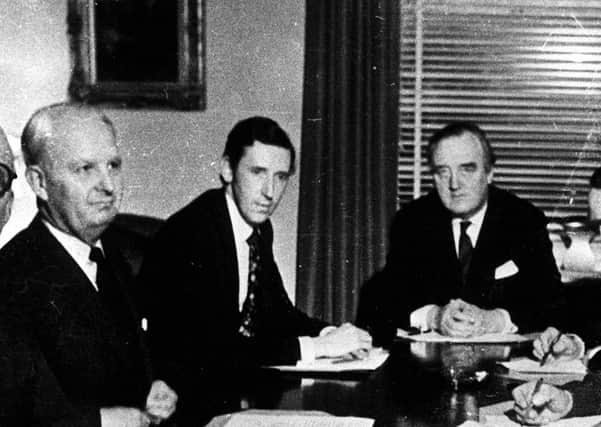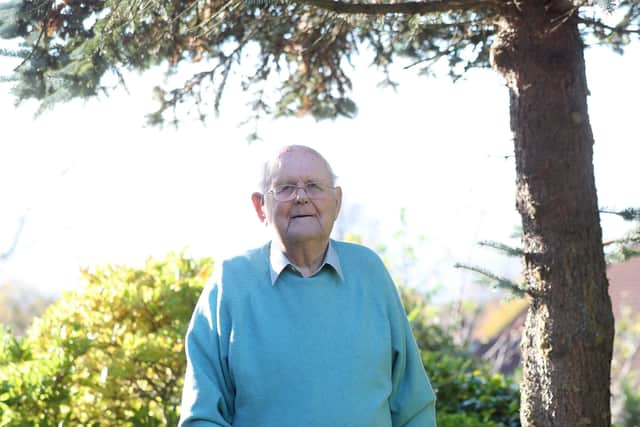Civil servant memoir: ‘I was aware that the new direct rule ministers thought everything was rotten in the state of Northern Ireland’


In August 1971, internment was introduced. It turned out to be a disaster.
Only Roman Catholics were rounded up and many of them had no recent connection with violence. The IRA thrived on it.
Advertisement
Hide AdAdvertisement
Hide AdMy own selfish concern was my family’s impending holiday in Co Donegal. For several years my wife June and I and our four children had stayed in Tullyillion outside Burtonport in a cottage, chalet or bungalow belonging to one of the extensive Gallagher family there.


We were always made most welcome, with a bucket of potatoes and a few fish awaiting our arrival. Our children played with theirs. Eddie Gallagher, the head of the tribe, took my two boys out fishing in his coracle.
I wondered how it would be this time. I need not have worried. With news of internment blaring out from every open door and window, Eddie took me aside and said something like: “Mr Duncan, I know things are bad in Belfast but out here it’s different.
A man like me is busy, maybe putting out the lobster pots, bringing in the turf and then sitting up half the night with the cow having a calf. We haven’t much time for politics here.”
And so on to January 1972 and Bloody Sunday.
Advertisement
Hide AdAdvertisement
Hide AdAlthough I had no direct involvement, I was aware of the air of gloom in the Castle, genuine sadness at what was a massacre, and a realisation that the British government, press and people would not stand for this state of affairs.
Almost immediately, I was aware of increased activity in the Home Office.
Where previously I had dealt only with my friend Philip Leyshon, I now found new voices on the phone and new signatures on letters. They were obviously gearing up for a takeover.
The enforced resignation of the NI Government and the creation of the Northern Ireland Office in March/April is well-documented and I will only touch on it lightly.
My impression of the incoming ministers was:
Advertisement
Hide AdAdvertisement
Hide Ad• William Whitelaw, Secretary of State — aristocratic, autocratic, but I liked him.
• Paul Channon – responsible for political development and for several departments.
He had connections with the Dufferin and Ava family at Clandeboye and sometimes stayed there when Duty Minister. I had little contact.
• David Howell – responsible for security and several departments.
I found him aloof.
Advertisement
Hide AdAdvertisement
Hide Ad• Lord Windlesham – answerable in the House of Lords for all the Departments– one of nature’s gentlemen.
• The top civil servant was Sir William Nield, a hard-driving Scot, whom I liked and got on with better than with some of his subordinates.
Sadly, however, he took over my spacious office (the old Billiards Room) and I was down-graded to a small office in the tower.
• One of the incoming Assistant Secretaries was Jack Howard-Drake.
Advertisement
Hide AdAdvertisement
Hide AdFor some reason, I mentioned the name to my father, who, within the hour, produced the roll of officers of 176 Light Anti-Aircraft Battery RA in 1940.
It read:
Major J.C.McDermott MC (later to be Lord Chief Justice of NI)
Capt L.S.Duncan MC (my father)
Capt xxx
Capt xxx
Capt xxx
Lieut xxx
Lieut xxx
2/Lt JTA.Howard-Drake
A photo-copy of this document was left, without comment, on the new man’s desk to await his arrival.
Just to let him know we had our own mafia.
Mr Whitelaw’s Private Office was a huge affair by our local standards – about 4/5 people in London, 4/5 in Belfast and his Principal Private Secretary shuttling with him, Mon –Wed in Belfast, Thurs – Fri in London.
Advertisement
Hide AdAdvertisement
Hide AdMinisters and staff were housed initially in the Culloden Hotel.
Some of the more senior staff were later re-accommodated in luxury homes – I recall my wife and I exchanging visits with couples on the seafront at Craigavad and Orlock Head, as well as the Officers’ Quarters at Lisburn. The senior civil servants in these houses were really pampered – cars to take their wives shopping and to hair-dressers, gardeners provided etc.
It is difficult to give an overall opinion on the incoming administrators. While I got on well with most of them individually, collectively I was aware of their belief that everything was rotten in the State of Northern Ireland.
They had a crusading zeal to reform. No ambitious young Whitehall civil servant was going to hold his hand up after a few months and say that perhaps they had been too drastic in their takeover.
Advertisement
Hide AdAdvertisement
Hide AdSome of their expressions were irritating such as speaking of “out” here as if we were a colony and the “British” Army as if it was a newcomer to NI, while there had been a Lt General’s command here even before “the Troubles”.
Most annoying was the expression “for UK eyes only” meaning that the document was only to be seen by Whitehall and not NI civil servants.
• Sinclair Duncan in the NI Civil Service from 1949 to 1985. He worked at in the ministries of Education, Finance and Agriculture, the Cabinet Office, Office of the Executive, NIO and the Department of Environment. He was awarded ISO in 1984. The rest of this memoir will be published each day in the News Letter this week
——— ———
A message from the Editor:
Advertisement
Hide AdAdvertisement
Hide AdThank you for reading this story on our website. While I have your attention, I also have an important request to make of you.
With the coronavirus lockdown having a major impact on many of our advertisers — and consequently the revenue we receive — we are more reliant than ever on you taking out a digital subscription.
Subscribe to newsletter.co.uk and enjoy unlimited access to the best Northern Ireland and UK news and information online and on our app. With a digital subscription, you can read more than 5 articles, see fewer ads, enjoy faster load times, and get access to exclusive newsletters and content. Visit https://www.newsletter.co.uk/subscriptions now to sign up.
Our journalism costs money and we rely on advertising, print and digital revenues to help to support them. By supporting us, we are able to support you in providing trusted, fact-checked content for this website.
Alistair Bushe
Editor